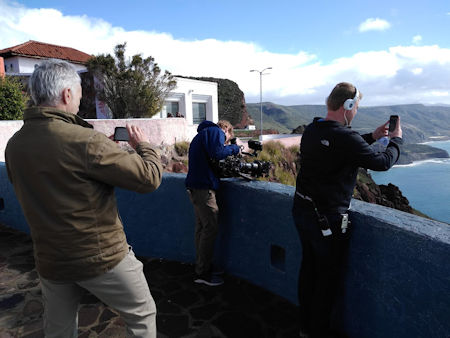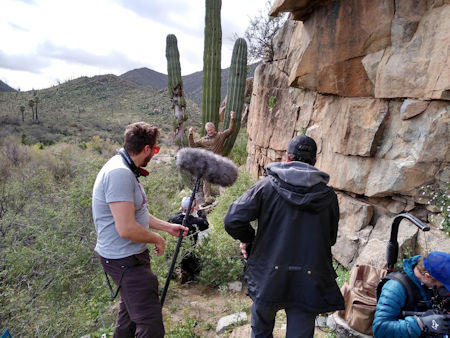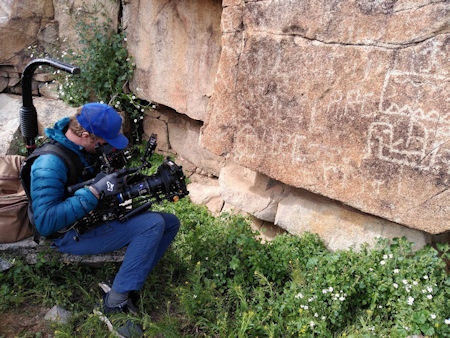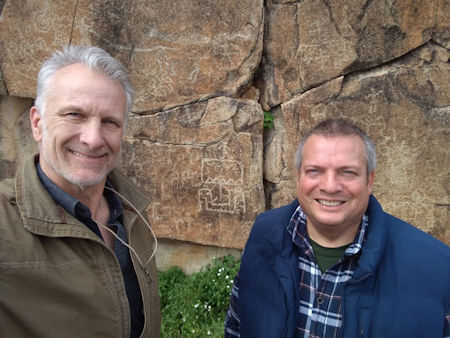 |  |
By David Kier

Scott Wolter, a forensic geologist from Minnesota, has been on a mission to find answers to mysteries of the past. Scott’s top rated television show begins its fourth season in 2019 on the Travel Channel, May 28, at 10 pm. In the new season’s first episode, Scott will travel to Baja California to examine a petroglyph site that very well might show a Viking ship had sailed of the coast of Baja California, over 500 years ago.
Minnesota-based Committee Films produces the show and they contacted me as I had visited the petroglyph site for over 40 years, plus I have authored a Baja-history book. They learned about my photographs and publications thanks to John Grasson of the Lost Ship of the Desert fame. Ten episodes are filmed to make up a season and the order in which they appear is determined by the network. After reviewing the ten episodes, this episode about the Vikings in the desert was placed in the #1 position!
The episode has three parts: the discovery of a Viking artifact in Sedona, Arizona; the search for a Viking ship buried near California’s Salton Sea; and the Baja California petroglyph that may show that a Viking ship had sailed past. The viewer will have an opportunity to weigh the evidence and follow Scott’s travels as he seeks the facts.

Zak Hanson is the Field Producer for this show, and he and I had many exchanges over several weeks about the location and travel details. I had hoped to be able to show them as much of Baja as possible given the fact they are traveling so far. The time available was very restrictive, and I was only able to convince them to add a stop at El Mirador, the viewpoint north of Ensenada, on our way to El Rosario. It was February and we were dodging rain clouds the whole weekend. Fortunately, there was a break in the rain when we stopped to see the fantastic view of the cliffs and ocean. Cameras were turned on and Scott and I did a talking scene. As we had over 200 miles to get to our accommodations that night, we had to get a move on. Lunch was enjoyed at Camalu and we did a couple of drone shots of the car on the highway. The sun was about to set as we passed the area of San Quintín and another stop was made for some sundown scenery south of El Socorro.
El Rosario’s Baja Cactus Motel provided the greatest comfort for the show’s crew of six, plus Scott, the Mexican film industry arranger, a security guard, an aid, and me. We had great meals and drinks next door at Mama Espinoza’s Restaurant where Scott Wolter became a big fan of the crab soup they serve! We were all up early for the 40-mile-drive to the petroglyph site near Mission San Fernando. A locked gate now prevents unwelcome visitors from getting closer than a mile from the mission. Local tour guide, Ed Lusk, of El Rosario’s Baja’s Best Bed & Breakfast was contacted to provide passage for us. The 3-mile dirt road was plenty wet with a couple of huge puddles to negotiate on the way in.

We were in 4 vehicles and stopped about a half mile from the petroglyph covered cliff to walk the remaining distance. Cameras were rolling and the giant cardón cactus were really stunning to this midwest group of filmmakers. Location is everything and Baja has the locations! With microphones and cameras on, Scott and I had a conversation about the site and a Viking legend as we walked towards the cliff. A drone is used to provide aerial shots and the film crew were busy getting different angles of us and the scenery. Soon we were at the cliff with the ship-like petroglyph and Scott and I get in close to examine it.
The site was already well documented, and the petroglyphs are illustrated in a 1978 book, Seven Rock Art Sites in Baja California. They are also and mentioned as far back as the 1910 book, Camp and Camino in Lower California. It is believed the rock art dates back between the years 1000 and 1500, placing it in the Viking period of North American exploration and before the Spanish period. Some publications have called the ship petroglyph, “The Galleon.”
The sky opened up on us before we were done filming, but the rain quickly passed by. All in all, the day’s work was successful and when we got back to El Rosario for lunch, everyone had smiles. That evening, at the Marriott in Tijuana, we celebrated what was one of their best location shoots and cheered the hospitality of Mexico they received. Naturally, I invited them to return so more of Baja’s wonders could be shared on future episodes of America Unearthed.

About David
David Kier is a veteran Baja traveler, author of 'Baja California - Land Of Missions' and co-author of 'Old Missions of the Californias'. Visit the Old Missions website.